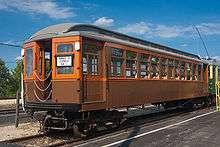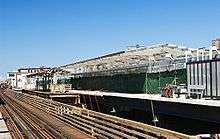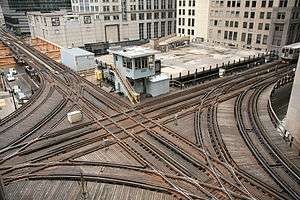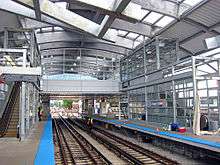North Side Main Line (CTA)
The North Side Main Line, commonly called the Howard Branch, is an elevated section of the Chicago "L" system. It is an active branch that is used for the Red, Purple, and Brown Line trains. As of 2012, it is the network's busiest rail branch, serving an average of 123,229 passengers each weekday.[1] The branch is 10.3 miles (16.6 km)[2] long with a total of 21 stations, from Howard Street in Rogers Park down to Lake Street in Chicago's Loop. The branch serves the north side of the city 24 hours a day, seven days a week.
Since 2005, this branch has been renovated several times and is currently being reconstructed. On January 7, 2011, CTA requested a rehabilitation program for the North Side Main Line.[3] This project is part of the Red Ahead program which started in the spring of 2012 and will go through to 2016.[4]
Route
The North Side Main Line connects to five other branches of the Chicago 'L', including the Ravenswood branch which is served by the Brown Line, the State Street Subway which is served by the Red Line, the Skokie Branch which is served by the Yellow Line, the Evanston Branch which is served by the Purple Line, and The Loop which is served by Brown and Purple Line trains. North of Howard, the Purple Line continues to Evanston and Wilmette, and the Yellow Line runs through southern Evanston en route to its terminus in Skokie.
The North Side Main Line serves the Near North Side, Old Town, Lincoln Park, Lakeview, Wrigleyville, Uptown, Edgewater and Rogers Park neighborhoods of Chicago, and has stops near Wrigley Field and Loyola University.
Connection
Yellow and Purple Line trains merge onto the line at its northern terminus, the Howard Street Station. Red Line trains and the weekday rush hour Purple Line Express trains continue south on the part of the line that is known as the Howard Branch. The Ravenswood branch connects to the Main Line north of the Belmont station, where Brown Line trains merge onto the Main Line. The part of the line south of this junction is known as the Loop Branch or the Ravenswood Connector. On the portion of this branch shared by Red and Brown Line trains, Red Line trains operate in the middle two tracks and Brown and Purple Line Express trains on the outer two tracks. The Red Line passes through Wellington and Diversey stations (which is served mainly by Brown Line trains) and all trains make another stop at Fullerton. After Fullerton, the Red Line descends into a portal after Armitage (which it does not stop at) and enters the State Street Subway, while Brown and Purple Line Express trains continue elevated for the remainder of the Main Line, which ends at the Merchandise Mart and enters The Loop at a three-quartered intersection over the intersection at Wells and Lake.
History
The line began operation on May 31, 1900, between The Loop and Wilson Avenue as the Northwestern Elevated Railroad. On May 16, 1908, service on the line was extended to Central street in Evanston.[2]
Since 2002, the main line has gone through plenty of renovations and rehabilitation projects and those projects are still going on as of today. Station renovations and track replacements have been happening ever since early 2012 and the CTA has been recently renovating all the Howard branch stations as part of the Red North Station Interim Improvements (see below).
Red North Station Interim Improvements
In November 2011, the CTA announced the Red North project as part of the Red Line Capital Investment.[5] The cost of the project was $86 million with a $57.4 million contract granted to contractor Kiewit Infrastructure. The project included seven stations to be renovated which included Granville, Morse, Thorndale, Argyle, Berwyn, Lawrence, and Jarvis. The project started on June 1, 2012 at Granville and finished its renovation on December 13, 2012 at Jarvis. The project also caused the elimination of slow zones in which trains accelerate faster than usual.
Red & Purple Modernization Project
As part of the program, the CTA also dubbed the "Red & Purple Modernization Project."[6] CTA recently studied four possible alternatives for the project and they are willing to provide community updates that can make improvements of those studies in late 2012 to 2013. CTA is also proposing to close down five stations on the Red and Purple lines. The five potential stations include Foster, South Boulevard, Jarvis, Lawrence, and Thorndale.[7]
In 2011, CTA planned a scoping process and which they provided public meetings and a comment period. The purpose of the scoping process was to ask operators and attentive parties to provide guidance on the proposed alternatives, the purpose and need for the project and the proposed topics of evaluation and potential effects and mitigation measures to be considered. During the scoping process CTA introduced six alternatives as part of the project. Based on public guidance, CTA is no longer studying three of those alternatives, and has since added an additional alternative, which studies the effects of Modernization without station consolidation.
Wilson Station Reconstruction Project
As of 2012, The CTA currently plans to start reconstructing the Wilson station, which would serve as a major transfer point between Red and Purple Line trains.[8] The station will have a rebuilt stationhouse with two island platforms to provide access between the two lines, two auxiliary entrances: one at Sunnyside Avenue and one on the north side of Wilson. Reconstruction began in October 2014 and will continue through December 2017. the station will remain open during reconstruction. The complete set of renderings and boards on display during the open house meeting are now available.[9]
Station listing
| North Side Main Line | ||
|---|---|---|
| Station | Location | Points of interest and notes |
| Howard |
7519 N. Paulina Street | Rogers Park, Connection to Evanston
Transfer station for all 'L' routes serving this station |
| Jarvis | 1523 W. Jarvis Avenue | Rogers Park, Emil Bach House |
| Morse | 1358 W. Morse Avenue | Rogers Park, Heartland Cafe |
| Loyola |
1200 W. Loyola Avenue | Rogers Park, Loyola University Chicago Lakeshore Campus |
| Granville |
1119 W. Granville Avenue | Edgewater, Berger Park |
| Thorndale | 1118 W. Thorndale Avenue | Edgewater, Edgewater Public Library, Thorndale Beach |
| Bryn Mawr | 1119 W. Bryn Mawr Avenue | Edgewater, Bryn Mawr Historic District, Edgewater Beach Hotel, Hollywood Beach |
| Berwyn | 1121 W. Berwyn Avenue | Edgewater, Foster Beach |
| Argyle | 1118 W. Argyle Street | Uptown, New Chinatown, Essanay Studios, St. Augustine College, Bachman House, Bezazian Public Library |
| Lawrence | 1117 W. Lawrence Avenue | Uptown, Uptown Theatre, Riviera Theatre, Aragon Ballroom |
| Wilson | 4620 N. Broadway Street | Uptown, Harry S Truman College |
| Buena | Buena Avenue and Kenmore Avenue | Closed August 1, 1949 |
| Sheridan | 3940 N. Sheridan Road | Graceland Cemetery, Howard Brown Health Center, Thorek Memorial Hospital
Transfer to Purple Line Express trains on Cubs game days only |
| Grace | Grace Street and Sheffield Avenue | Closed August 1, 1949 |
| Addison |
940 W. Addison Street | Lakeview, Wrigley Field- home of the Chicago Cubs, Metro, Wrigleyville, Center on Halsted, the I.O. Theater, formerly improvolympic |
| Clark | Clark Street and Roscoe Street | Closed August 1, 1949 |
| Belmont |
945 W. Belmont Avenue | Lakeview, Briar Street Theater, Boystown, The Vic Theatre
Transfer station for all 'L' routes serving this station |
| Wellington |
945 W. Wellington Avenue | Illinois Masonic Medical Center |
| Diversey |
943 W. Diversey Avenue | Lincoln Park, Elks National Memorial Headquarters Building |
| Wrightwood | Closed August 1, 1949 | |
| Fullerton |
943 W. Fullerton Avenue | Lincoln Park, DePaul University, Children's Memorial Hospital, St. Josaphat Roman Catholic Church, Biograph Theater
Transfer station for all 'L' routes serving this station |
| Webster | Closed August 1, 1949 | |
| Armitage |
944 W. Armitage Avenue | Goose Island Brewery, Lincoln Park Zoo |
| Willow | Willow Street and Sheffield Avenue | Closed in May 17, 1942 |
| Halsted | Closed August 1, 1949 | |
| Larrabee | Larrabee Street, Ogden Avenue and North Avenue | Closed August 1, 1949 |
| Sedgwick |
1536 N. Sedgwick Street | The Second City, Piper's Alley, Old Town, Chicago History Museum, North Avenue Beach, Steppenwolf Theatre Company |
| Schiller | Closed August 1, 1949 | |
| Division | Closed August 1, 1949 | |
| Oak | Oak Street and Orleans Street | Closed July 31, 1949 |
| Chicago |
301 W. Chicago Avenue | Moody Bible Institute, Cabrini–Green, River North Gallery District |
| Grand | Grand Avenue and Franklin Street | Closed September 20, 1970 |
| Kinzie | Kinzie Street and Wells Street | Closed 1921; replaced by Grand |
| Merchandise Mart |
350 N. Wells Street | Merchandise Mart |
| North Water Terminal | North Water Street and Clark Street | Opened November 17, 1908, closed July 31, 1949 |
Image gallery
 The North Side Main Line runs on the old Northwestern Elevated Railroad
The North Side Main Line runs on the old Northwestern Elevated Railroad The Belmont station under construction in 2007
The Belmont station under construction in 2007 A temporarily rerouted Red Line train leaves the North Side Main Line and enters the Loop
A temporarily rerouted Red Line train leaves the North Side Main Line and enters the Loop The Howard station complex serves as the end of the main line
The Howard station complex serves as the end of the main line
See also
External links
- North Side Main Line: Howard Branch at Chicago-L.org
- North Side Main Line: Loop Branch at Chicago-L.org
References
- ↑ "2012 Annual Ridership Report" (PDF). Chicago Transit Authority. transitchicago.com. Retrieved January 2, 2014.
- 1 2 Garfield, Graham. "North Side Main Line". Chicago-L.org. Chicago 'L'. Retrieved July 19, 2012.
- ↑ "CTA wants input on North Side Mainline Rehab". Prairie State Blue. Retrieved July 19, 2012.
- ↑ "CTA Red Ahead". Chicago Transit Authority. Retrieved August 24, 2012.
- ↑ "CTA Red Ahead - Red North project". Chicago Transit Authority. Retrieved August 24, 2012.
- ↑ "Red & Purple Modernization". Chicago Transit Authority. transitchicago.com. Retrieved December 8, 2012.
- ↑ "Environmental Impact Statement Scoping Information" (PDF). North Red and Purple Modernization Project. Chicago Transit Authority. Retrieved January 28, 2011.
- ↑ "Red Ahead - Wilson Station Reconstruction". Chicago Transit Authority. Retrieved October 6, 2012.
- ↑ "Wilson Reconstruction Project Display Boards". Chicago Transit Authority. transitchicago.com. Retrieved October 13, 2012.
